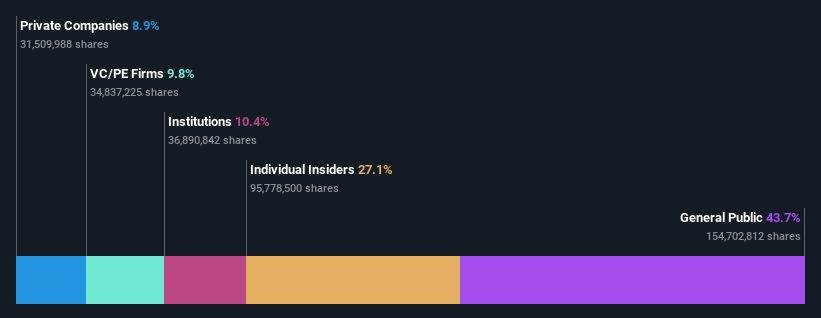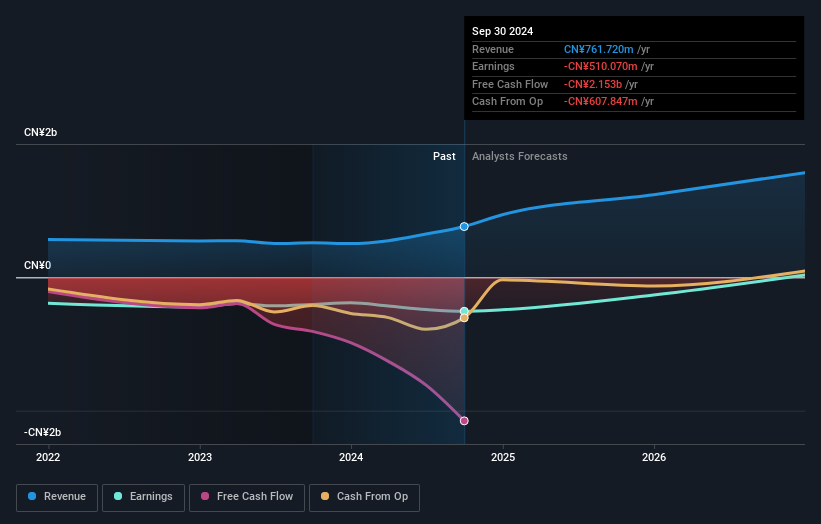Shenzhen Intellifusion Technologies Co., Ltd.'s (SHSE:688343) stock price dropped 12% last week; individual investors would not be happy

Key Insights
- Shenzhen Intellifusion Technologies' significant individual investors ownership suggests that the key decisions are influenced by shareholders from the larger public
- The top 8 shareholders own 50% of the company
- 27% of Shenzhen Intellifusion Technologies is held by insiders
A look at the shareholders of Shenzhen Intellifusion Technologies Co., Ltd. (SHSE:688343) can tell us which group is most powerful. We can see that individual investors own the lion's share in the company with 44% ownership. In other words, the group stands to gain the most (or lose the most) from their investment into the company.
While the holdings of individual investors took a hit after last week’s 12% price drop, insiders with their 27% also suffered.
In the chart below, we zoom in on the different ownership groups of Shenzhen Intellifusion Technologies.
Check out our latest analysis for Shenzhen Intellifusion Technologies

What Does The Institutional Ownership Tell Us About Shenzhen Intellifusion Technologies?
Institutional investors commonly compare their own returns to the returns of a commonly followed index. So they generally do consider buying larger companies that are included in the relevant benchmark index.
As you can see, institutional investors have a fair amount of stake in Shenzhen Intellifusion Technologies. This suggests some credibility amongst professional investors. But we can't rely on that fact alone since institutions make bad investments sometimes, just like everyone does. When multiple institutions own a stock, there's always a risk that they are in a 'crowded trade'. When such a trade goes wrong, multiple parties may compete to sell stock fast. This risk is higher in a company without a history of growth. You can see Shenzhen Intellifusion Technologies' historic earnings and revenue below, but keep in mind there's always more to the story.

Hedge funds don't have many shares in Shenzhen Intellifusion Technologies. Looking at our data, we can see that the largest shareholder is the CEO Ning Chen with 25% of shares outstanding. For context, the second largest shareholder holds about 9.8% of the shares outstanding, followed by an ownership of 3.3% by the third-largest shareholder.
On further inspection, we found that more than half the company's shares are owned by the top 8 shareholders, suggesting that the interests of the larger shareholders are balanced out to an extent by the smaller ones.
While studying institutional ownership for a company can add value to your research, it is also a good practice to research analyst recommendations to get a deeper understand of a stock's expected performance. There is some analyst coverage of the stock, but it could still become more well known, with time.
Insider Ownership Of Shenzhen Intellifusion Technologies
While the precise definition of an insider can be subjective, almost everyone considers board members to be insiders. Company management run the business, but the CEO will answer to the board, even if he or she is a member of it.
I generally consider insider ownership to be a good thing. However, on some occasions it makes it more difficult for other shareholders to hold the board accountable for decisions.
Our most recent data indicates that insiders own a reasonable proportion of Shenzhen Intellifusion Technologies Co., Ltd.. It has a market capitalization of just CN¥18b, and insiders have CN¥4.8b worth of shares in their own names. That's quite significant. Most would say this shows a good degree of alignment with shareholders, especially in a company of this size. You can click here to see if those insiders have been buying or selling.
General Public Ownership
The general public-- including retail investors -- own 44% stake in the company, and hence can't easily be ignored. This size of ownership, while considerable, may not be enough to change company policy if the decision is not in sync with other large shareholders.
Private Equity Ownership
With a stake of 9.8%, private equity firms could influence the Shenzhen Intellifusion Technologies board. Some investors might be encouraged by this, since private equity are sometimes able to encourage strategies that help the market see the value in the company. Alternatively, those holders might be exiting the investment after taking it public.
Private Company Ownership
We can see that Private Companies own 8.9%, of the shares on issue. It might be worth looking deeper into this. If related parties, such as insiders, have an interest in one of these private companies, that should be disclosed in the annual report. Private companies may also have a strategic interest in the company.
Next Steps:
It's always worth thinking about the different groups who own shares in a company. But to understand Shenzhen Intellifusion Technologies better, we need to consider many other factors. For example, we've discovered 3 warning signs for Shenzhen Intellifusion Technologies (2 are significant!) that you should be aware of before investing here.
If you are like me, you may want to think about whether this company will grow or shrink. Luckily, you can check this free report showing analyst forecasts for its future.
NB: Figures in this article are calculated using data from the last twelve months, which refer to the 12-month period ending on the last date of the month the financial statement is dated. This may not be consistent with full year annual report figures.
New: Manage All Your Stock Portfolios in One Place
We've created the ultimate portfolio companion for stock investors, and it's free.
• Connect an unlimited number of Portfolios and see your total in one currency
• Be alerted to new Warning Signs or Risks via email or mobile
• Track the Fair Value of your stocks
Have feedback on this article? Concerned about the content? Get in touch with us directly. Alternatively, email editorial-team (at) simplywallst.com.
This article by Simply Wall St is general in nature. We provide commentary based on historical data and analyst forecasts only using an unbiased methodology and our articles are not intended to be financial advice. It does not constitute a recommendation to buy or sell any stock, and does not take account of your objectives, or your financial situation. We aim to bring you long-term focused analysis driven by fundamental data. Note that our analysis may not factor in the latest price-sensitive company announcements or qualitative material. Simply Wall St has no position in any stocks mentioned.
About SHSE:688343
Shenzhen Intellifusion Technologies
Shenzhen Intellifusion Technologies Co., Ltd.
Mediocre balance sheet low.


